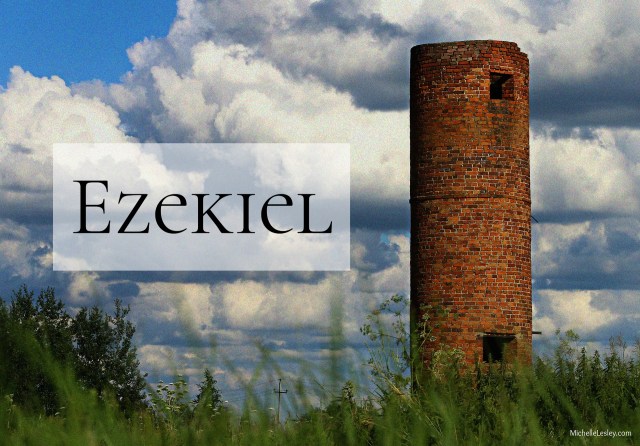
Previous Lessons: 1, 2, 3, 4, 5, 6, 7, 8, 9, 10, 11
 Read Ezekiel 24-25
Read Ezekiel 24-25
![]()
Questions to Consider
1. Review your notes from last week’s lesson and be reminded of the things that lead into, and set the stage for, this week’s passage. How does the theme of chapters 22-23 give us background for the beginning of chapter 24? What is the setting for chapter 24? (24:2) Recall- where is Ezekiel right now that God has to tell him what’s happening in Jerusalem?
2. Usually, when God has Ezekiel warn the people through a parable, He gives the explanation of the parable afterwards. This time, God gives the explanation beforehand, in 24:2b. What is the general idea this parable in 24:3-14 is about? Read 24:1-14 in through the lens of 24:2b to help you understand it, and be sure to use your cross-references as you read.
(If you do not understand the Old Testament concept and tactics of siege as a military attack strategy, I would strongly recommend that you read this article.)
It may also help you understand 24:1-14 better to get a particular visual in your head: Which city is being besieged in this parable? (24:2b) And by what was Jerusalem completely encircled? Picture that structure: a piece of land with a wall around its circumference. Now picture one of your cooking pots – a flat bottom with “walls” around its circumference. See the structural similarity? So, if Jerusalem is the “pot,” what is in the pot? (24:4-5) What does the fire underneath the pot (24:10) represent? (Hint: In lesson 10 {link above} we recalled that God’s _____ is often represented by fire.) Once the fire of God’s wrath is lit by the Babylonian siege, what’s going to happen to the Israelites in the “pot” of Jerusalem?
What does it mean that the “pot” has “corrosion” in it? (24:6, 11-12) What is God going to do to the “pot” because of that corrosion? (24:11-14)
In 24:7-8, use your cross-references and explain the significance of the blood shed in Jerusalem being “poured out on the bare rock” instead of poured out on the ground and covered. (Hint: Think back to the concept of shame over sin from lesson 10 {link above}.) Since Israel has shed blood publicly and unashamedly, how will God execute His wrath upon them (24:8)? Think about this passage in light of your own repentance for sin and Christ’s blood covering your sin and shame. Look at 24:13: “I would have cleansed you…” and compare this with 18:23, 31-32 (you may also want to revisit lesson 9 {link above}). Describe God’s heart toward the sinner. Does He take pleasure in exercising wrath against sinners?
3. Read 24:15-27. Explain in your own words what would happen to Ezekiel’s wife, how Ezekiel would act in response, and what this was to communicate to the people. Use your cross-references to understand why things like putting on his turban and shoes would have seemed strange to the people for someone whose wife had just died. Why would God not allow the people to mourn over the desecration of temple and the loss of the sons and daughters they had left behind in Jerusalem when they went into exile?
4. Read chapter 25. Using a good Old Testament map, locate Ammon, Moab/Seir, Edom, and Philistia, and any of the other cities or geographical locations mentioned. Where were these located in relation to Israel? Recall from lesson 10 (link above) what God said about Israel’s reputation in the eyes of the pagan nations surrounding them.
What was the main sin God judged each of these nations for, and what was their punishment?
Ammon (25:1-7)-
Moab/Seir (25:8-11)-
Edom (25:12-14)-
Philistia (25:15-17)-
Consider the mockery of God’s people by Ammon, and the punishment God meted out for this mockery, and compare this to the New Testament mentions of mockers and scoffers against Jesus, Christians, and the church.
5. What group of people is God exercising His wrath upon in chapter 24? In chapter 25? When it comes to God’s wrath against sin, if you’re an unrepentant sinner does it matter whether or not you say you’re one of God’s people? Does God view you any differently than a pagan?
Homework
• Add 24:24, 27, and 25:5, 7, 11, 17 to your “And you/they shall know that I am the Lord” list. Write down who will know that He is the Lord, what will cause them to know He is the Lord, and why God wants them to know He is the Lord.
• Think about God’s Father/child relationship to Israel in light of earthly parent/child relationships (if you don’t have children, think back to when you were a child or think about other parents you know). When your child has misbehaved, have you ever said, “I expect better from you than that,” or, “You know better than that.”? What did you mean when you said that? Explain why God would take that same posture with His “child,” Israel, compared with His “I might have expected that from the neighbor kid,” posture toward the pagan nations surrounding Israel.
Suggested Memory Verse


